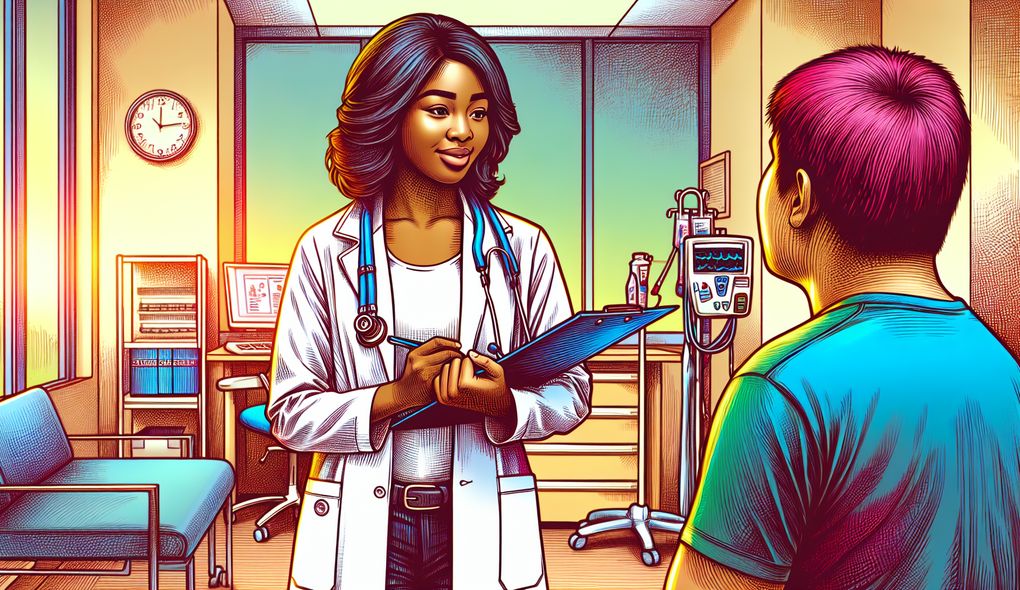How do you approach monitoring patient outcomes and adjusting care plans accordingly?
INTERMEDIATE LEVEL

Sample answer to the question:
When monitoring patient outcomes and adjusting care plans, I take a comprehensive approach. First, I regularly assess patients' progress and gather data such as blood glucose levels, weight, and A1C results. I also keep track of any symptoms or complications that arise. Next, I collaborate with the healthcare team, including physicians, dietitians, and other professionals, to analyze the data and determine the effectiveness of the current care plan. If necessary, I make adjustments to medication dosages, lifestyle recommendations, and education strategies. Additionally, I prioritize patient education, ensuring they understand the importance of self-management and are equipped with the knowledge and skills to make informed decisions about their care. Finally, I stay up-to-date on the latest advancements in diabetes treatment and technology to provide the best possible care to my patients.
Here is a more solid answer:
Monitoring patient outcomes and adjusting care plans is a crucial aspect of my role as a Diabetes Nurse Practitioner. To ensure effective monitoring, I consistently assess patients' progress using various metrics, such as reviewing blood glucose levels, conducting physical exams, and evaluating lab results. I also maintain open lines of communication with patients to understand their experiences and any challenges they may face. Collaboration is key, so I regularly consult with physicians, dietitians, and other team members to analyze the data and discuss possible adjustments to the care plan. This collaboration allows for a holistic approach, considering the medical, dietary, and lifestyle aspects of diabetes management. I prioritize patient education, providing them with the necessary knowledge and skills to actively participate in their care. By empowering patients, I enhance their self-management abilities and help them make informed decisions. Additionally, I stay updated on the latest advancements in diabetic treatments and technologies through continuous learning and attending conferences, ensuring I can provide the most up-to-date and evidence-based care.
Why is this a more solid answer?
The solid answer expands on the basic answer by providing specific details and examples. It mentions the use of various assessment methods, collaboration with other healthcare professionals, and the importance of patient education. However, it could be further improved by including more specific examples and outcomes from past experiences.
An example of a exceptional answer:
Monitoring patient outcomes and adjusting care plans is a dynamic process that requires a comprehensive and patient-centered approach. Firstly, I conduct regular assessments, which include objective measurements such as blood glucose levels and A1C, as well as subjective evaluations of symptoms and quality of life indicators. I also facilitate ongoing communication with patients to gather their feedback and maintain a strong patient-provider relationship. Collaborating with the healthcare team is vital in this process, as we analyze data collectively and discuss potential adjustments to the care plan. For example, if a patient shows poor glycemic control, we may consider modifying medication dosages, intensifying lifestyle interventions, or referring them to other specialists as needed. Patient education plays a crucial role, and I ensure that each patient receives personalized education sessions tailored to their unique needs and preferences. By empowering patients with knowledge and skills, I promote self-management and long-term success in diabetes care. Finally, I stay informed about advancements in diabetic treatments and technologies by regularly attending conferences, reading relevant literature, and engaging in professional development opportunities. This ensures that I provide the most innovative and evidence-based care to my patients.
Why is this an exceptional answer?
The exceptional answer takes the solid answer to the next level by providing additional details about assessment methods, patient feedback, specific adjustments to care plans, and personalized education. It also emphasizes the importance of staying informed about advancements in diabetic care. This answer showcases a deep understanding of the role and demonstrates a strong commitment to patient-centered care.
How to prepare for this question:
- Review and understand the latest advancements in diabetic treatments and technologies.
- Reflect on past experiences where you successfully adjusted care plans to improve patient outcomes.
- Think about how you prioritize patient education and tailor it to individual needs.
- Consider examples of effective collaboration with other healthcare professionals in managing diabetes care.
- Prepare to discuss specific metrics and assessment methods you use to monitor patient outcomes.
What are interviewers evaluating with this question?
- Clinical skills
- Communication
- Patient education
- Decision-making
- Knowledge of diabetic treatments
- Monitoring patient outcomes
- Adjusting care plans

